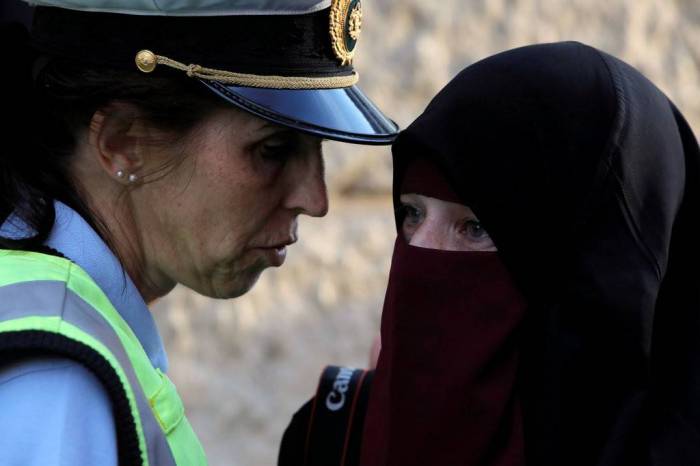The law, passed in May, does not specifically mention Muslim dress — it states that “anyone who wears a garment that hides the face in public will be punished with a fine” — but protesters say Muslim women are the intended target.
On Wednesday evening, women wearing the traditional Muslim face veil, known as a niqab, and full coverage burqas were joined by dozens of supporters wearing makeshift coverings and handkerchiefs tied across their faces at a protest in central Copenhagen. A simultaneous demonstration was held in the city of Aarhus.
And at the center of a protest for a woman’s right to cover up were women who didn’t. Bare legs, exposed shoulders and long blond hair mixed with head scarves and black veils.
The police did not fine the protesters or intervene. Under the new law, protesters who cover their faces while peacefully exercising their right of expression are exempt from ban.
The protest began near Mjolnerparken, a housing complex heavily populated by immigrants, which the government has described as a “ghetto” and “parallel society” because of crime and lack of integration. The protest finished with a human chain near one of Copenhagen’s main police stations.
Some carried posters with the messages, “Fingers away from my niqab” and “My clothes, my choice.”
A group called Kvinder i Dialog, which means Women in Dialogue, helped organize the demonstrations. On social media it said the new law “discriminates, criminalizes and suppresses a minority — Danish Muslim women.” Only about 200 women in Denmark are believed to wear the face veil, according to Danish researchers.
One protester, Sabina, 21, a student teacher who declined to give her last name because other members of Women in Dialogue have received threats, called the law oppressive and Islamophobic.
“I’m not going to take my niqab off, but will try to continue my education. To wear the niqab is a spiritual choice and now a sign of protest,” she said. “The only result of this law is that we’re going to stick more firmly to our faith and niqab and encourage more women to wear it.”
She said she planned to continue to protest, waiting to see when police issue the first fine. First-time offenders face fines of 1,000 Danish kroner, around $150. Fake beards, balaclavas, and other face masks are also banned.
Sabina maintained that it was her choice to wear the religious garment.
“It’s illogical to say you want to liberate women by force or fines. I refuse to believe the politicians have women’s best interests in mind,” she said.
Defenders of the law say it is a matter of public safety. Justice Minister Soren Pape Poulsen said earlier this year that it was also a matter of Danish values.
“I see a discussion of what kind of society we should have with the roots and culture we have, that we don’t cover our face and eyes, we must be able to see each other and we must also be able to see each other’s facial expressions. It’s a value in Denmark,” Mr. Poulsen said in March.
Human rights groups argue that the ban on the face veil violates the rights of Danish citizens.
New York Times
More about: Denmark
















































